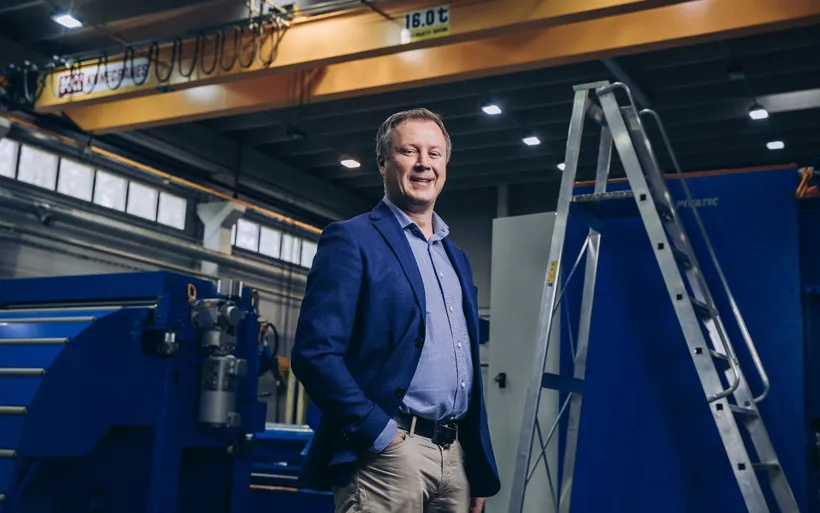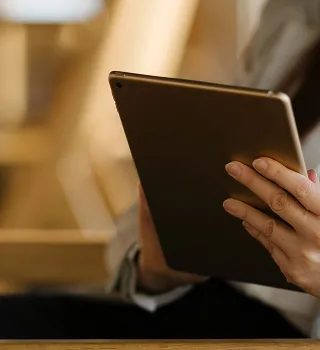Nearly all of the metal industry enterprise’s production is exported – risks need to be managed

An SME needs to identify and manage export-related risks. Risks increase when no less than 95 per cent of turnover comes from export trade. Pivatic’s General Manager Mika Virtanen wants to ensure two things: the high quality of products and fund repatriation. Offering buyer credit has proved to be a good means of securing deals.
Quality is a must for SMEs facing fierce international competition. It is also important for risk management.
“Our machines can be found in more than 100 factories around the world. Each machine must offer high quality as an enterprise of this size cannot afford to build a worldwide service organisation. Machines must be durable,” notes Virtanen.
To ensure high quality, Pivatic manufactures sheet metal working machines at its own factory in Hyvinkää. The machines are used in the manufacture of air conditioners, metal doors and office furnishings, among other things. The enterprise’s main markets are in Europe, North America, Brazil and, to an increasing extent, Asia.
The fact that it takes 6–12 months to manufacture a single machine is another risk for Pivatic to manage.
“The sales process is even longer, it can easily be one to three years. Luckily, the payment terms in our sector emphasise early-stage payments. Our goal is that 90 per cent of the machine is paid for before it is delivered,” says Virtanen.
“Sales activities are carried out by our own local sales personnel as well as partners,” he adds.
Pivatic aims to secure orders by offering its clients buyer credit. The Buyer Credit Guarantee offered with Finnvera’s aid means that it is easier for a foreign client enterprise to get financing and time for payment for the machine they have ordered when Finnvera acts as the loan guarantor.
The Hyvinkää-based enterprise has minimised financing risks by using letters of credit. A letter of credit is the commitment of the buyer’s bank to pay the transaction price to the seller.
“Letters of credit are generally used in Asia and Russia. We also use a credit limit if we have to sell machines with payment terms where payments are made at later stages,” explains Virtanen.
A coil punching machine and a cutting centre are being manufactured at Pivatic’s factory in Hyvinkää. After testing, the machine is disassembled, placed in containers and transported as sea freight to the client in India. Markus Kakko is one of Pivatic’s 60 employees. Pivatic’s General Manager Mika Virtanen needs to ensure that export risks are not realised.
India is a draw but local payment practices and culture should be learnt
Pivatic made its first export trade transactions to Sweden already in the late 1980s. The enterprise entered the German market in the early 1990s, and the US market in the late 1990s.
The reason was the same as in many other metal industry enterprises during the recession: necessity.
“The home market was finite and export trade was absolutely necessary for the entire enterprise’s existence,” says Virtanen.
Pivatic’s latest major market entry is India. Two large coil punching machines and cutting centres are just about to be completed for an Indian client. The size of individual transactions may rise to several millions of euros. Last year, Pivatic’s turnover was approximately EUR 15 million.
“Indians visit European trade fairs actively. Compared to our competitors, our machines are expensive. However, advanced technology and high quality are appreciated also in India. Trade fairs are still the most important means of reaching potential clients,” notes Virtanen.
According to Finnvera’s Finance Manager Ilkka Soininen, India offers a lot of potential for Finnish enterprises, but the exporter should investigate the enterprises’ payment practices and culture in advance.
If Finnvera is involved in financing solutions, the minimum information it needs about the buyer enterprise is credit and financial statements information. The exporter must ask the foreign buyer to provide this information. In the most exotic countries, it may take weeks to check this information.
“With Pivatic’s transactions in India, we were arranging pre-delivery working capital with the bank, with a letter of credit as a term of payment. In another transaction, we were involved in covering the buyer risk. However, the buyer managed to arrange financing in the local market. Sometimes even an indication from a specialised financing company may lead to the realisation of an export trade transaction and the local arrangement of buyer financing,” says Soininen.
Petri Ryhänen doing installation work at Pivatic’s factory in Hyvinkää.
More medium-sized enterprises
Pivatic is a part of Ursviken Group Oy. Another part of the group is Ursviken Technology Ab, a Swedish enterprise that manufactures edging presses.
According to Virtanen, the group brings advantages especially in the North American market as Ursviken’s subsidiary sells both manufacturers’ machines in the United States.
“We seek constant international growth and, in the future, we should have a stronger foothold in Asia. We are also trying to increase our role in life cycle services. At the moment, service business accounts for one fifth of the enterprise’s turnover,” says Virtanen.
His wish is that other Finnish SMEs would be more active in seeking growth abroad.
“We must involve more medium-sized enterprises with a turnover of EUR 50–1,000 million. It would benefit everyone.”
More information about payment mechanisms, export risk covering and export financing on Finnvera.fi's pages Export financing for SME's (in Finnish).
